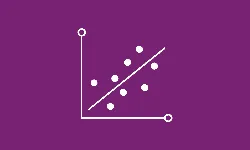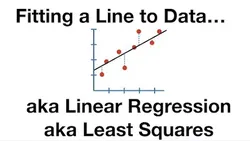
The Classical Linear Regression Model 
This course introduces the classical linear regression model, which is used to analyze the relationship between a dependent variable and one or more independent variables. It covers topics such as hypothesis testing, model specification, and interpretation of results. ▼
ADVERTISEMENT
Course Feature
![]() Cost:
Cost:
Free
![]() Provider:
Provider:
Coursera
![]() Certificate:
Certificate:
Paid Certification
![]() Language:
Language:
English
![]() Start Date:
Start Date:
24th Apr, 2023
Course Overview
❗The content presented here is sourced directly from Coursera platform. For comprehensive course details, including enrollment information, simply click on the 'Go to class' link on our website.
Updated in [March 06th, 2023]
This course provides an introduction to the Classical Linear Regression Model (CLRM) and the Ordinary Least Squares (OLS) estimator. Participants will learn to use the CLRM and OLS to discuss the assumptions needed for the OLS to deliver true regression parameters. The course will cover cases with one independent variable for one dependent variable, before progressing to regression analysis by generalising the bivariate model to multiple regression. Different model-building philosophies will be explored, with particular focus on the general-to-specific approach, and how to use goodness-of-fit statistics as the measures of “how well your model explains variations in the dependent variable”. Examples will be used to help clarify which kind of relationship is of interest, and how to interpret it. Participants will also have the opportunity to apply their learning to estimating the Capital Asset Pricing Model using real data with R.
This course is suitable for beginners, with little prior knowledge required, although an ability to graph two variables in the xy framework, an understanding of basic algebra and taking derivatives, and knowledge of matrix algebra will provide an advantage. By the end of the course, participants will be able to describe the problems that econometrics can help addressing, explain why some hypotheses are needed for the approach to produce an estimate, calculate the coefficients of interest in the classical linear regression model, interpret the estimated parameters and goodness of fit statistics, and estimate single and multiple linear regression models with R.
[Applications]
The application of this course can be seen in various fields such as economics, finance, and marketing. The Classical Linear Regression Model can be used to analyze the relationship between different variables and to make predictions. It can also be used to identify the factors that influence a certain outcome. Additionally, the course can be used to understand the assumptions needed for the OLS to deliver true regression parameters and to interpret the estimated parameters and goodness of fit statistics. Furthermore, the course can be used to estimate single and multiple linear regression models with R.
[Career Paths]
Recommended Career Paths:
1. Data Scientist: Data Scientists use econometrics to analyze large datasets and develop predictive models. They use the Classical Linear Regression Model (CLRM) and the Ordinary Least Squares (OLS) estimator to identify patterns and trends in data. Data Scientists also use the general-to-specific approach to model building and use goodness-of-fit statistics to measure the accuracy of their models. Data Science is a rapidly growing field and is expected to continue to grow in the coming years.
2. Financial Analyst: Financial Analysts use econometrics to analyze financial data and make predictions about future market trends. They use the Classical Linear Regression Model (CLRM) and the Ordinary Least Squares (OLS) estimator to identify patterns and trends in data. Financial Analysts also use the general-to-specific approach to model building and use goodness-of-fit statistics to measure the accuracy of their models. Financial Analysis is a rapidly growing field and is expected to continue to grow in the coming years.
3. Market Researcher: Market Researchers use econometrics to analyze market data and develop strategies for businesses. They use the Classical Linear Regression Model (CLRM) and the Ordinary Least Squares (OLS) estimator to identify patterns and trends in data. Market Researchers also use the general-to-specific approach to model building and use goodness-of-fit statistics to measure the accuracy of their models. Market Research is a rapidly growing field and is expected to continue to grow in the coming years.
4. Business Analyst: Business Analysts use econometrics to analyze business data and develop strategies for businesses. They use the Classical Linear Regression Model (CLRM) and the Ordinary Least Squares (OLS) estimator to identify patterns and trends in data. Business Analysts also use the general-to-specific approach to model building and use goodness-of-fit statistics to measure the accuracy of their models. Business Analysis is a rapidly growing field and is expected to continue to grow in the coming years.
[Education Paths]
Recommended Degree Paths:
1. Bachelor of Science in Economics: This degree program provides students with a comprehensive understanding of economic theory and its application to real-world problems. Students will learn the fundamentals of micro and macroeconomics, as well as the principles of econometrics and data analysis. This degree is ideal for those interested in pursuing a career in economics, finance, or business.
2. Master of Science in Econometrics: This degree program provides students with an in-depth understanding of econometric methods and their application to economic and financial data. Students will learn the fundamentals of econometrics, including linear regression, time series analysis, and forecasting. This degree is ideal for those interested in pursuing a career in economics, finance, or data science.
3. Doctor of Philosophy in Economics: This degree program provides students with an advanced understanding of economic theory and its application to real-world problems. Students will learn the fundamentals of micro and macroeconomics, as well as the principles of econometrics and data analysis. This degree is ideal for those interested in pursuing a career in academia, research, or policymaking.
4. Master of Science in Data Science: This degree program provides students with an in-depth understanding of data science methods and their application to economic and financial data. Students will learn the fundamentals of data science, including machine learning, artificial intelligence, and predictive analytics. This degree is ideal for those interested in pursuing a career in data science, analytics, or business intelligence.
Developing Trends:
1. Bachelor of Science in Economics: With the increasing demand for data-driven decision making, there is a growing need for professionals with a strong understanding of economics and econometrics. As such, there is an increasing demand for graduates with a Bachelor of Science in Economics.
2. Master of Science in Econometrics: With the increasing demand for data-driven decision making, there is a growing need for professionals with a strong understanding of econometrics and data analysis. As such, there is an increasing demand for graduates with a Master of Science in Econometrics.
3. Doctor of Philosophy in Economics: With the increasing demand for data-driven decision making, there is a growing need for professionals with a strong understanding of economics and econometrics. As such, there is an increasing demand for graduates with a Doctor of Philosophy in Economics.
4. Master of Science in Data Science: With the increasing demand for data-driven decision making, there is a growing need for professionals with a strong understanding of data science and analytics. As such, there is an increasing demand for graduates with a Master of Science in Data Science.
Course Syllabus
Aims and Uses of Econometrics
Welcome to Coursera and Queen Mary University of London, we are excited to have you studying with us. We are going to help you prepare for your studies by ensuring you know exactly what is expected of you throughout your course and how to most effectively engage with the platform. We will look at how the platform works as well as how you will interact with your peers. You will be introduced to the university you are studying with and we will share some top tips on how to succeed with Coursera. This week we shall start by getting to know Coursera as you will be introduced to the platform and explore how to use the various functions which will support your learning journey. You will see how you can make the most of your learning experience which will enable you to succeed on this course.The Classical Linear Regression Model
Interpretation of the Ordinary Least Squares Parameters
This week we are going to explore the aims and uses of econometrics for economists and finance professionals and consider some of the questions that econometrics can address. We will also look at the types of data we can work with, and discuss the transformation and manipulation of this data. This week will be focussing on the single regression model.Capital Asset Pricing Model
This week we shall be focussing on the Classical Linear Regression Model as well as the classical linear regression model. We will explore the assumptions of the OLS approach and see why we need those assumptions. We shall also discuss the Multiple Linear Regression Model and consider why we use linear algebra.Pros & Cons

Theoretically deep and practically relevant.

Rich course content.

Good structure and content.

Incompatible lectures and requirements.

No explanation or tutorial for R studio.

Administrative problems with grading.
Course Provider

Provider Coursera's Stats at AZClass
Discussion and Reviews
0.0 (Based on 0 reviews)
Explore Similar Online Courses

MongoDB Tutorial for Beginners 2022

How to make embroidery design&bird embroidery

Python for Informatics: Exploring Information

Social Network Analysis

Introduction to Systematic Review and Meta-Analysis

The Analytics Edge

DCO042 - Python For Informatics

Causal Diagrams: Draw Your Assumptions Before Your Conclusions

Whole genome sequencing of bacterial genomes - tools and applications

Data Science: Linear Regression

Simple Linear Regression for the Absolute Beginner

Linear Regression and Linear Models
 Related Categories
Related Categories
 Popular Providers
Popular Providers
Quiz
 Submitted Sucessfully
Submitted Sucessfully
1. What type of data should be used for econometrics?
2. What is the purpose of the Classical Linear Regression Model (CLRM)?
3. What is the general-to-specific approach?
4. What is the Ordinary Least Squares (OLS) estimator?
Correct Answer: It is a method for estimating the parameters of a linear regression model.


Start your review of The Classical Linear Regression Model